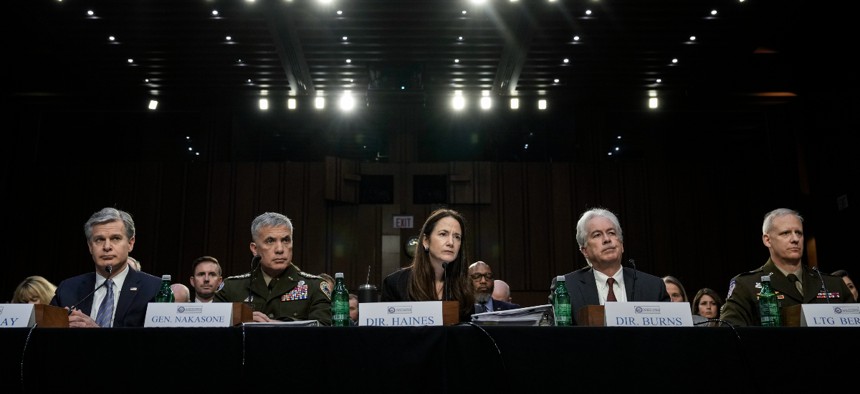Intelligence Threat Assessment Highlights Tech Vulnerabilities, Chinese Competition

(L-R) FBI Director Christopher Wray, Director of the National Security Agency Gen. Paul Nakasone, Director of National Intelligence Avril Haines, CIA Director William Burns and Defense Intelligence Agency Director Lt. Gen. Scott Berrier testify during a Senate Intelligence Committee hearing concerning worldwide threats, on Capitol Hill March 8, 2023 in Washington, DC. Drew Angerer/Getty Images
The Senate’s annual hearing on national security threats underscored the importance of technology in this arena, particularly with growing competition and threats from China.
Cyberattacks and an increasingly competitive technology landscape are posing a large threat to American national security, according to leaders of the intelligence community who spoke at Wednesday’s Senate Select Committee on Intelligence hearing.
Officials stated that cyberattacks, technology competition, surveillance and reliance on critical technology from other countries, among other things, posed threats to American national security. The hearing occurred in conjunction with the release of the intelligence community’s annual threat assessment report.
“We also need to focus on technology, R&D dollars, strategic investment flows and supply chains because whoever leads and wins the challenges in technology domains will have an edge in national security competition in the future,” said Senate Select Committee on Intelligence Chairman Mark Warner, D-Va. “We’ve already seen this with the outsized impact of cyber tools, which now give both state and non-state actors alike the power to cripple countries’ critical infrastructure and entire economies from behind the keyboard without firing a single shot. And we’re increasingly seeing rising competition in the technology space with authoritarian regimes that are challenging democratic norms at home and around the world.”
Intelligence agency leaders expressed concern at China’s growing technology sector and power.
“The People’s Republic of China, which is increasingly challenging the United States, economically, technologically, politically and militarily around the world remains our unparalleled priority,” National Intelligence Director Avril Haines said.
Top of mind for both the hearing attendees and Congress at large was the risk posed by TikTok—which is owned by Chinese company ByteDance. The app has been banned on federal government devices, and the intelligence community witnesses urged it to be entirely banned in the U.S., despite its popularity, because of national security concerns.
FBI Director Christopher Wray noted that the Chinese government could effectively control the software on TikTok because of its relationship to the app’s parent company.
Committee Vice Chairman Marco Rubio, R-Fla., said the Chinese Communist Party could control user data, control software on devices and drive narratives “to divide Americans.”
In response to the last point, Wray noted, “we’re not sure that we would see many of the outward signs of it happening if it was happening, and I think the thing that the most fundamental piece that cuts across every one of those risks and threats that you mentioned that I think Americans need to understand is that something that’s very sacred in our country—the difference between the private sector and the public sector—that’s a line that is non-existent in the way the CCP operates.”
However, several leaders stated that the discussion should not end with TikTok and should apply to any technology or device that is used for surveillance, data collection or otherwise poses a threat from an adversary.
Intelligence leaders also stressed how critical new and emerging technologies are to intelligence and national security.
“New technologies, particularly in the field of AI and biotechnologies are being developed and proliferating faster than companies and governments are able to shape norms governing their use, protect against privacy challenges associated with them and prevent dangerous outcomes that they can trigger,” Haines said. “The convergence of emerging technologies is likely to create breakthroughs that are not as predictable and that risk a rapid development of more interconnected asymmetric threats to U.S. interest.”
She added that “relatedly, foreign states’ malicious use of digital information and communication technologies will become more pervasive, automated, targeted and complex during the next few years, threatening to distort publicly available information and probably outpacing efforts to protect digital freedoms, and—at the same time—educate audiences on how to distinguish fact from propaganda. Authoritarian governments usually are the principal offenders of digital repression, and of course, democracies with open information environments are the most vulnerable to them.”
“Technology and economic security have become inextricably intertwined with national security,” Wray said, noting that the government must work more closely with businesses and the private sector to build a resilient ecosystem and protect national security, as 85% of critical infrastructure is with the private sector.
National Security Agency Director General Paul Nakasone stated that bolstering the tech workforce and chasing after the next technology is critical. He also stressed the importance of partnerships to address those challenges and how crucial it is to have a secure supply chain, as was done with the CHIPS and Science Act to restore American manufacturing of a critical component—semiconductors.
Furthermore, Nakasone expressed concern about China and Russia’s cybersecurity posture, noting they are “capable cyber adversaries.” For example, he noted that China is taking more risks, such as increasingly stealing intellectual property and performing influence operations.






